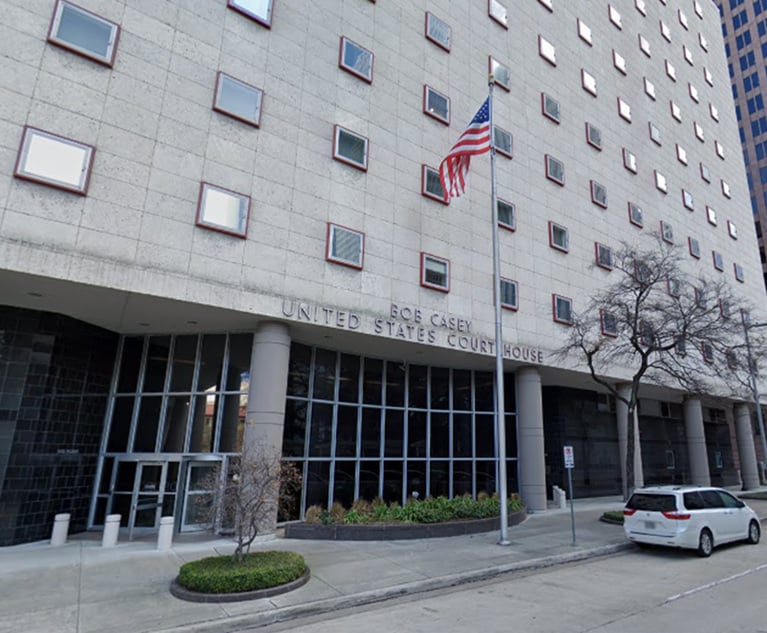Should Firm Leaders Know How Individual Partners Vote on a Merger?
Some argue it doesn't matter because votes don't happen unless leaders are clear how their partners will land. But there are risks of holding an open vote, observers say.
June 11, 2019 at 06:34 PM
5 minute read

The cultural differences among U.K. and U.S. law firms are dwindling in some respects as compensation models are tweaked, legal technology is adopted more universally, and law firms expand around the globe. But last week's news surrounding merger talks between Allen & Overy and O'Melveny & Myers highlighted one area where firms on either side of the pond typically differ: how partners vote on mergers.
The American Lawyer affiliate Legal Week reported last week that Allen & Overy would hold an open vote if and when the partners weigh in on the deal, meaning the firm would know how each partner voted. Several people who spoke with The American Lawyer about the process said that system struck them as rare and had potential downfalls—to a point.
As DLA Piper global co-chairman Roger Meltzer notes, this is an example of how U.K. firms have “levels of democracy that are probably more extreme than the U.S. firms.” He said there are typically two schools of thought on knowing how partners vote, regardless of what they are voting on: 1) partners are owners in a business and should “be a grown up about it” and say how they vote, or 2) firms should want partners to vote honestly without fear of retribution from firm leadership and therefore allow them to vote in secret.
“I don't think you'd want people to fear retribution on something as transformative as a merger,” said one frequent adviser on law firm mergers.
Michael Pollack, who as global head of strategy led Reed Smith through several transformative mergers, says all of the firm's votes are closed and so was the case at the firms Reed Smith acquired.
Partners have plenty of opportunity to express their opinions publicly in advance of the vote if they want to, but Pollack said the firm doesn't want to force partners into voting yes and potentially have them fear they would face backlash if it was known they voted no.
Both Meltzer and Pollack cited the cultural component to how firms handle votes. At DLA Piper, a secretary of elections will oversee a vote and may know how people vote, but Meltzer said that doesn't trickle up to him. Pollack said potential merger partners likely aren't a good cultural match if they differ dramatically on things like how partners are allowed to vote.
But Does It Really Matter?
The American Lawyer has previously noted how law firm partnership votes are dwindling to begin with. They typically do remain in cases of transformative mergers, which can be highly charged votes within law firms, as leaders manage expectations and messaging internally, to the merger partner and the press.
But most of that jockeying goes on before a vote takes place, and if it isn't clear that the partners will vote yes, the firms won't, or shouldn't, hold the vote, the adviser on firm mergers said.
Most firms require a supermajority vote on a merger of either two-thirds or three-quarters of the partnership. But the adviser said most law firm leaders want 80% to 90% of partners voting yes.
“You don't want to strongarm people into voting a certain way because even if it works initially, the risk later is that they vote with their feet and leave,” the adviser said. “You win the battle but lose the war.”
Meltzer agreed that it's his job to sell the deal to as substantial a portion of the partnership as possible.
“I don't care if I know or don't. Whether it's open, closed or sideways, if I haven't created a narrative that makes this not a close call, I'm not doing my job because that in some ways means to me that I'm stretching to do a bad deal, and … as a leader … you cannot stretch to do a bad deal,” Meltzer said.
So if votes aren't going to happen unless leadership is sure it's a yes, what harm would an open vote be?
Every once in a while, the adviser said, mergers go to a vote and, to everyone's surprise, they don't go through.
But more importantly, the law firm adviser noted, partners may hear the narrative of what the heavy-hitters in firms want and feel pressure to vote that way, or feel it's a foregone conclusion so they may as well vote yes. The adviser said group think isn't helpful when voting on something that so greatly impacts the future of the firm.
There are several reasons for an open vote, from purely a cultural norm for an individual firm to a way to send a message to partners at your firm or the target, observers have said. The law firm adviser noted that once a deal goes public, leadership has limited time to get partners on board as “time is not on your side.”
“Obviously people have their own agendas,” Meltzer said. “They do all kinds of things in the context of a merger which are not necessarily consistent with what you want the vision of the firm to be. But unless [votes] are in the 80-90% range, [leadership] better go back to the drawing board.”
In the United States, it seems getting to that 80-90% ratio is viewed as best done beforehand, not through implementing an open vote.
This content has been archived. It is available through our partners, LexisNexis® and Bloomberg Law.
To view this content, please continue to their sites.
Not a Lexis Subscriber?
Subscribe Now
Not a Bloomberg Law Subscriber?
Subscribe Now
NOT FOR REPRINT
© 2025 ALM Global, LLC, All Rights Reserved. Request academic re-use from www.copyright.com. All other uses, submit a request to [email protected]. For more information visit Asset & Logo Licensing.
You Might Like
View All
Law Firms Expand Scope of Immigration Expertise Amid Blitz of Trump Orders
6 minute read
Am Law 100 Lateral Partner Hiring Rose in 2024: Report

KPMG's Bid to Practice Law in U.S. on Indefinite Hold, as Arizona Justices Exercise Caution

JCPenney Seeks Return of More Than $1.1M From Jackson Walker For Bankruptcy Work
3 minute readTrending Stories
- 1'Knowledge of Mismatch:' Fed Judge Offers Guidance on How to Hold Banks Accountable for Erroneous Transfers
- 2PAGA Claims Must Now Be 'Headed'
- 3Million-Dollar Verdict: Broward Jury Sides With Small Business
- 4'Reluctant to Trust'?: NY Courts Continue to Grapple With Complexities of Jury Diversity
- 5'Careless Execution' of Presidential Pardons Freed Convicted Sex Trafficker, US Judge Laments
Who Got The Work
J. Brugh Lower of Gibbons has entered an appearance for industrial equipment supplier Devco Corporation in a pending trademark infringement lawsuit. The suit, accusing the defendant of selling knock-off Graco products, was filed Dec. 18 in New Jersey District Court by Rivkin Radler on behalf of Graco Inc. and Graco Minnesota. The case, assigned to U.S. District Judge Zahid N. Quraishi, is 3:24-cv-11294, Graco Inc. et al v. Devco Corporation.
Who Got The Work
Rebecca Maller-Stein and Kent A. Yalowitz of Arnold & Porter Kaye Scholer have entered their appearances for Hanaco Venture Capital and its executives, Lior Prosor and David Frankel, in a pending securities lawsuit. The action, filed on Dec. 24 in New York Southern District Court by Zell, Aron & Co. on behalf of Goldeneye Advisors, accuses the defendants of negligently and fraudulently managing the plaintiff's $1 million investment. The case, assigned to U.S. District Judge Vernon S. Broderick, is 1:24-cv-09918, Goldeneye Advisors, LLC v. Hanaco Venture Capital, Ltd. et al.
Who Got The Work
Attorneys from A&O Shearman has stepped in as defense counsel for Toronto-Dominion Bank and other defendants in a pending securities class action. The suit, filed Dec. 11 in New York Southern District Court by Bleichmar Fonti & Auld, accuses the defendants of concealing the bank's 'pervasive' deficiencies in regards to its compliance with the Bank Secrecy Act and the quality of its anti-money laundering controls. The case, assigned to U.S. District Judge Arun Subramanian, is 1:24-cv-09445, Gonzalez v. The Toronto-Dominion Bank et al.
Who Got The Work
Crown Castle International, a Pennsylvania company providing shared communications infrastructure, has turned to Luke D. Wolf of Gordon Rees Scully Mansukhani to fend off a pending breach-of-contract lawsuit. The court action, filed Nov. 25 in Michigan Eastern District Court by Hooper Hathaway PC on behalf of The Town Residences LLC, accuses Crown Castle of failing to transfer approximately $30,000 in utility payments from T-Mobile in breach of a roof-top lease and assignment agreement. The case, assigned to U.S. District Judge Susan K. Declercq, is 2:24-cv-13131, The Town Residences LLC v. T-Mobile US, Inc. et al.
Who Got The Work
Wilfred P. Coronato and Daniel M. Schwartz of McCarter & English have stepped in as defense counsel to Electrolux Home Products Inc. in a pending product liability lawsuit. The court action, filed Nov. 26 in New York Eastern District Court by Poulos Lopiccolo PC and Nagel Rice LLP on behalf of David Stern, alleges that the defendant's refrigerators’ drawers and shelving repeatedly break and fall apart within months after purchase. The case, assigned to U.S. District Judge Joan M. Azrack, is 2:24-cv-08204, Stern v. Electrolux Home Products, Inc.
Featured Firms
Law Offices of Gary Martin Hays & Associates, P.C.
(470) 294-1674
Law Offices of Mark E. Salomone
(857) 444-6468
Smith & Hassler
(713) 739-1250










